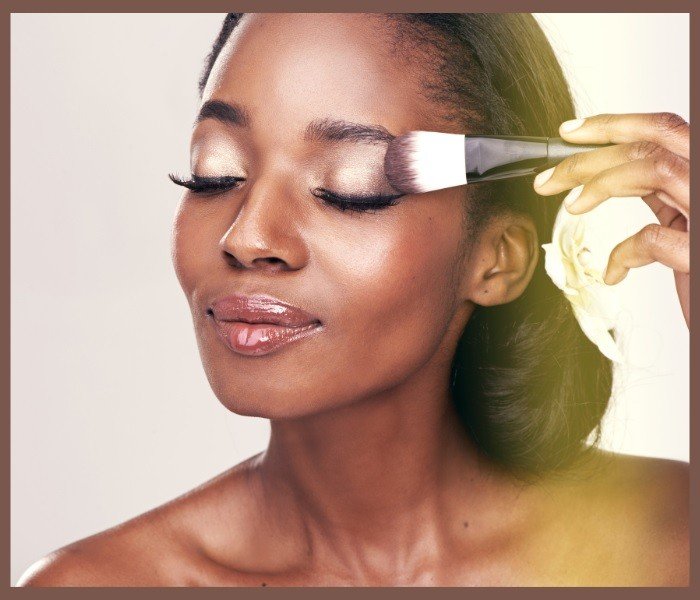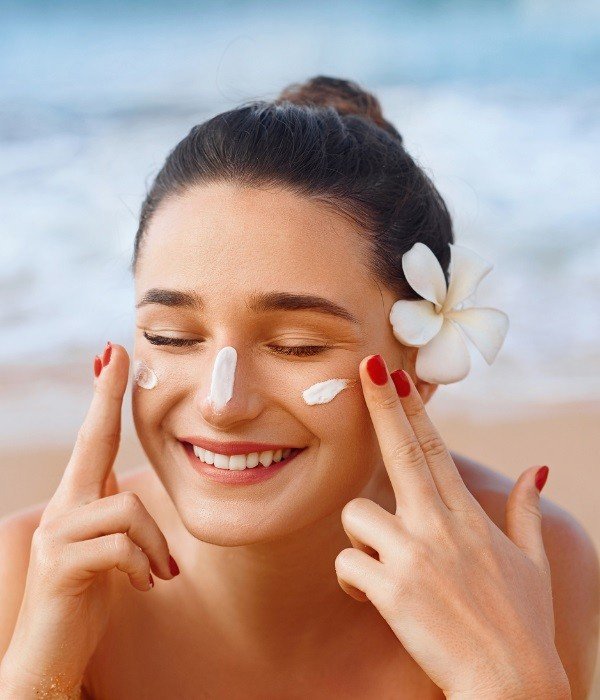This post contains affiliate links.
Updated on January 1, 2024
No, concealer will not allow you to tan as it blocks the sun’s rays from reaching your skin. If you’re someone who enjoys soaking up the sun or using a tanning bed, you might wonder if using concealer on your face will affect the end result of your bronze glow.
Concealer is formulated to provide coverage on your skin’s surface, blocking the sun’s rays from penetrating and inducing a tan. While concealer can’t give you a tan, it is important to protect your skin from the sun’s harmful UV rays by wearing sunscreen or a hat, or seeking shade during peak hours.
Contents
The Basics Of Tanning And How It Works
Tanning has been a popular activity for centuries, serving the purpose of obtaining darker skin without the need for direct sun exposure. Nowadays, there are a variety of methods to achieve a glowing tan, whether it’s through self-tanning products or visiting a tanning salon.
But how does tanning actually work? Let’s dive into the basics.
Definition Of Tanning
Tanning is defined as the process of darkening one’s skin, often through exposure to UV radiation. The result is a darker complexion that is sought after by many people who associate it with a healthy and attractive appearance.
How Tanning Works
Tanning occurs due to exposure to UV radiation, which stimulates the production of melanin in the skin. Melanin is the pigment responsible for the color of our skin, hair, and eyes. When the skin is exposed to UV radiation, the cells in the skin known as melanocytes produce more melanin as a form of protection against the harmful effects of UV rays.
There are two types of UV radiation: uva and UVB. Uva penetrates deeper into the skin and is responsible for causing premature aging and wrinkles. Uvb is responsible for sunburns and more superficial damage to the skin. Both types of radiation can contribute to the tanning process.
The Role Of Melanin In Tanning
As mentioned, melanin is responsible for the color of our skin, and it plays a critical role in the tanning process. When exposed to UV radiation, the melanocytes in our skin produce more melanin, which leads to a darker complexion.
People with naturally darker skin have more melanin, making it easier for them to tan and providing them with more natural protection against the harmful effects of UV radiation.
It’s worth noting that while tanning can provide a desirable appearance, excessive exposure to UV radiation can have severe health consequences, including skin cancer and premature aging. Therefore, it’s essential to take necessary precautions when exposing yourself to UV radiation.
The sun-kissed look has been a popular trend for many years, but it’s essential to understand how tanning works and the role of melanin in the process. Safety should always come first, so be sure to protect your skin and limit exposure to harmful UV radiation.
Related: Does Concealer Go On Before Or After Tinted Moisturizer?
The Role Of Concealer In Tanning
Many of us wonder if the application of concealer can affect our skin’s ability to tan. Concealer is an essential makeup product that covers blemishes and makes our skin look flawless. It also acts as a barrier between the sun’s UV rays and our skin.

Definition Of Concealer
Concealer is a cosmetic product used to camouflage dark circles, blemishes, and other imperfections on the skin. It comes in different shades, textures, and forms, including liquid, cream, stick, and powder. The primary function of concealer is to brighten and even out the skin tone, but it can also act as a barrier to prevent sun damage.
Types Of Concealer
There are various types of concealers available, including:
- Color correcting concealer: These neutralize specific color imperfections, such as green to cancel out redness and orange to combat dark circles.
- Illuminating concealer: These have light-reflecting particles that create a radiant look.
- Full-coverage concealer: These provide maximum coverage to conceal intense blemishes like scars and pimples.
- Hydrating concealer: These have a moisturizing effect to avoid creasing and dryness.
How Does Concealer Work On The Skin?
Concealer works by covering the imperfections on the skin’s surface, creating an even skin tone. It also moisturizes the skin, prevents shine, and adds a radiant look. Different types of concealers have different consistency and composition, which can affect how they work on the skin.
The barrier effect of concealer can prevent tanning by blocking the skin’s exposure to UV rays.
The Effectiveness Of Concealer As A Skin Protectant
The extent to which concealer can protect the skin from sun damage depends on its SPF rating. Some concealers contain SPF, which is a measure of the product’s effectiveness at blocking UVB rays. Typically, the SPF rating in makeup products is lower than in dedicated sunscreen products.
A concealer with SPF can still provide some level of protection, which is better than nothing.
Concealer can affect your skin’s ability to tan, depending on its consistency and the level of SPF protection it provides. While it may have some level of barrier effect, it is not a substitute for sunscreen. To ensure your skin is protected, it is recommended to use a dedicated sunscreen with a high SPF value and reapply throughout the day.
Additionally, it would help if you also removed the concealer before applying sunscreen to make sure the skin can absorb it correctly.
Related: How To Cover A Black Eye Without Concealer?
Can You Tan Through Concealer? Understanding The Science

Most people assume that wearing concealer could inhibit the ability to get a tan, but in fact, that’s not entirely truthful. While the majority of sunscreens and similar products block UV rays from penetrating the skin, not all concealers are formulated to do the same.
Here we will explore the truth behind whether you can tan through the concealer.
Dispelling The Myth Of Tanning Through Concealer
There is a common misunderstanding that wearing concealer inhibits tanning the skin. The truth is that this is a myth. The majority of concealers are not formulated with SPF, so it does not block UV rays from penetrating the skin.
That said, you should not use it as a substitute for sunscreen.
The Role Of Concealer In Blocking Uv Rays
The primary role of concealer is to hide blemishes, dark circles, and other skin imperfections. Concealer doesn’t typically offer the protection needed to prevent tanning. For concealer to block UV rays, it would have to contain some form of SPF protection.
In such cases, the product would act more as a sunscreen than a traditional concealer.
Factors That Influence Tanning Through Concealer
Various factors contribute to the effectiveness of using concealer while tanning. Some of the most influential factors include the product’s formulation, the level of tanning, and the duration of sun exposure. As we mentioned earlier, if the concealer doesn’t contain SPF, it won’t offer a barrier to the sun’s UV rays, and you’ll still tan as usual.
How To Use Concealer While Tanning?

If you’re still keen on using concealer while tanning, here are some tips to help you safeguard your skin:
- Always apply sunscreen first before using the concealer.
- If you want to use a concealer with SPF, make sure it has an SPF factor of at least 30.
- Apply the concealer gently, using light strokes spread over your face.
- Try to avoid excessive sun exposure since it could damage your skin.
Using concealer while tanning is a safe and reasonable practice, provided you don’t use it as a replacement for your sunscreen. Concealer does not generally block UV rays from penetrating your skin, nor is it designed primarily for sun protection.
Therefore, it is always best to use high-quality sunscreen with appropriate SPF protection.
Tips For Safe Tanning And Maximizing The Use Of Concealer
Precautions To Take While Tanning
Tanning is always a risk, which is why it’s crucial to take care of your skin while doing it. Here are some essential precautions to keep in mind:
- Use sunscreen: Sunscreen with SPF 30 or higher is necessary whenever you are exposed to UV radiation.
- Time for your tanning: Tanning is best done in the morning or late afternoon when the sun is mild and not too intense.
- Avoid peak sun hours: During peak sun hours (10:00 am to 4:00 pm), the UV rays are at their strongest, so it’s best to avoid tanning during this time.
- Use protective gear: Apart from sunscreen, you can also wear hats, sunglasses, and long-sleeve clothing to lessen direct exposure to the sun.
- Know your skin type: Different skin types react differently to UV radiation. Knowing your skin type can help you adjust the amount of time spent tanning accordingly.
Limitations Of Using Concealer For Sun Protection
Using concealer for sun protection may seem like a good idea, but it is not the most effective method of protecting the skin. Here are some limitations to take note of:
- Concealers are not as effective as sunscreens: Sunscreen is specially formulated to protect the skin against UV radiation. On the other hand, concealers may not be useful enough.
- Concealers only provide minimal protection: Even the most effective concealers only offer a minimal level of protection against UV radiation. It’s best to use a combination of products to maximize protection.
- Concealers may clog pores: Concealers may clog your pores, causing acne breakouts and other skin irritations. This could lead to more harm than good.
Best Practices For Using Concealer To Protect The Skin While Tanning
If you still prefer to use concealer for sun protection, here are some tips to get the most out of it:
- Choose a waterproof concealer: Using waterproof concealer will ensure that it doesn’t come off easily when you sweat or swim.
- Apply it generously: Apply the concealer liberally to the exposed areas of your skin, making sure to blend it evenly.
- Use a makeup brush: To get the best results, use a makeup brush to apply the concealer evenly over the skin.
- Reapply regularly: Concealers tend to wear off quickly, so be sure to reapply every two hours or after swimming or sweating.
Related: How To Fix Cakey Concealer?
Alternative Ways To Protect The Skin During Tanning

While tanning is more or less an inevitable process, some safer alternatives can be used to protect the skin:
- Use bronzers and self-tanners: Bronzers and self-tanners offer a much safer alternative to tanning beds or direct sun exposure. They offer the same look but with less risk of skin damage.
- Seek out shade: Staying under a shaded area during tanning can significantly reduce the risk of exposure to UV radiation.
- Hydrate: Drinking water and using moisturizers can help keep your skin hydrated and avoid premature aging due to sun exposure.
Using concealer for sun protection while tanning has its limitations, but it can still be used effectively with the right practices. There are safer alternatives like bronzers, self-tanners, and staying under shaded areas. Remember to take precautions when tanning to reduce skin damage and ensure a healthy glow.
Frequently Asked Questions?
Can You Use Concealer After Tanning?
It’s okay to use concealer after you’ve tanned. Opt for a new shade that suits your skin tone.
Does Concealer Protect Against Sunburn?
Concealer provides little or no protection against sunburn. Always use sunscreen when exposed to the sun.
What Are The Best Ways To Protect Your Skin While Tanning?
Apply sunscreen, wear protective clothing, avoid tanning beds and sunbathe during low uv hours.
How Do You Get Rid Of Sunburn Caused By Tanning?
To soothe sunburn, take a cool bath, moisturize with aloe vera, drink plenty of water, and avoid further sun exposure.
Conclusion
As we come to the end of this blog post, the answer to the question, can you tan through concealer, is no. While concealer may provide some coverage for your skin, it is not designed to block out the sun’s harmful rays.
You should always use proper sunscreen before heading out to prevent damage to your skin. Remember, sun damage is not just about getting a tan, but also about long-term effects like premature aging and skin cancer. It’s important to protect your skin from the sun’s UV rays, and one of the best ways to do that is by using a high-quality sunscreen.
So the next time you plan to hit the beach or enjoy the outdoors, ensure that you apply the sunscreen first, and then use your favorite concealer to achieve that flawless look. Stay safe and enjoy the sun responsibly!

